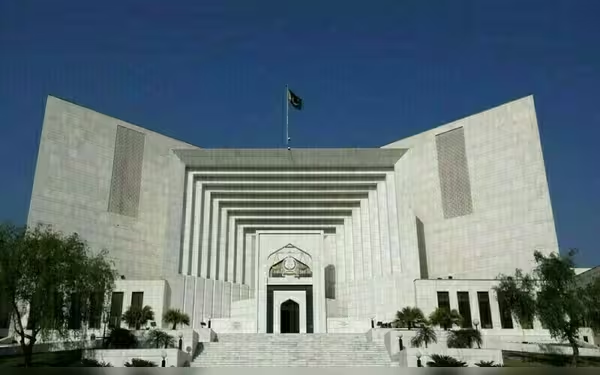Wednesday, January 15, 2025 04:17 PM
Supreme Court Dismisses Jamaat-i-Islami's Panama Papers Plea
- Supreme Court rules JI's plea not a 'live issue'.
- Court advises JI to approach NAB for grievances.
- JI seeks investigation into 436 individuals named in Panama Papers.
 Image Credits: dawn
Image Credits: dawnSupreme Court of Pakistan dismisses Jamaat-i-Islami's plea on Panama Papers, advising to approach NAB for grievances.
In a significant ruling, the Supreme Court of Pakistan has dismissed the plea of the Jamaat-i-Islami (JI) regarding the infamous Panama Papers case. This case, which has been a focal point of political discourse in the country, involves allegations against numerous individuals for allegedly hiding wealth in offshore companies. The JI, led by former chief Sirajul Haq, sought to hold accountable 436 individuals whose names were revealed in the Panama Papers. However, the court deemed the matter not to be a "live issue," suggesting that the political party should instead approach the National Accountability Bureau (NAB) for any grievances.
The constitutional bench, presided over by Justice Aminud Din Khan, emphasized that the JI's petition, originally filed in August 2016, lacked the urgency required for judicial intervention. During the proceedings, Advocate Muhammad Ishtiaq Ahmad Raja, representing the JI, pointed out that a Joint Investigation Team (JIT) was previously established to investigate former Prime Minister Nawaz Sharif in connection with the Panama Papers. He argued that a similar investigation should be initiated for the other individuals implicated in the leaks.
Justice Musarrat Hilali raised pertinent questions about the relevance of the previous JIT, noting that it was formed for a specific case. She expressed curiosity about the fate of the broader Panama scandal, indicating that the court was not inclined to revisit past decisions. The counsel for JI insisted that the NAB should be directed to investigate the other individuals named in the Panama Papers, similar to how Nawaz Sharif was scrutinized.
Justice Jamal Khan Mandokhail highlighted the limitations imposed on the NAB following amendments to its ordinance, which restrict its authority to act on certain matters. This raises an important question: under what legal framework can a JIT be formed for the Panama scandal? The court's response suggested that it was not concerned with past cases, focusing instead on the current legal landscape.
In a written submission to the court, Sirajul Haq argued that if Nawaz Sharif faced stringent measures for his alleged offshore dealings, then the same standards should apply to the other 436 individuals. The JI's 18-page response requested the Supreme Court to establish a JIT to investigate these cases and report back to the apex court.
The Supreme Court's decision reflects a broader trend in Pakistan's legal and political environment, where accountability remains a contentious issue. The dismissal of the JI's plea underscores the complexities involved in addressing corruption and financial misconduct, particularly when it involves high-profile figures. As the political landscape continues to evolve, the question of accountability will likely remain at the forefront of public discourse.
While the Supreme Court's ruling may seem like a setback for the JI, it also highlights the ongoing challenges in the fight against corruption in Pakistan. The call for accountability is a crucial aspect of governance, and as citizens, it is essential to remain vigilant and informed about the actions of those in power. The Panama Papers case serves as a reminder of the importance of transparency and the need for robust mechanisms to ensure that all individuals, regardless of their status, are held accountable for their actions.













